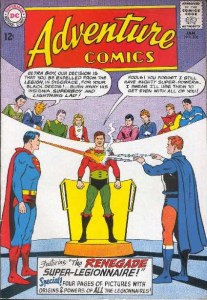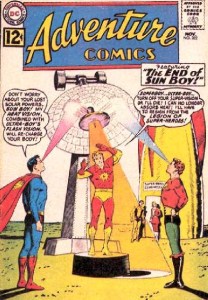Saturday, January 03, 2015 2:19 PM
I saw a discussion of “The Secret History Of Wonder Woman” on some book-talk of CSPAN’s just the other day—and just now, before being interrupted, I was watching a PBS documentary about Comic Book Super Heroes. I love to see this celebration of my boyhood head-space, just as I enjoyed the explosion of Sci-Fi obsession that came with “Star Wars” and the invention of CGI-FX. Unlike the occasional, and temporary, popularization of classical music, or poetry, caused by a temporal confluence with a trending meme or personality, the popularization of Sci-Fi, and of Super-Heroes, is permanent, due to hyper-commercialization of these genres.
Everyone recognizes that commercializing classical music or poetry is just another way of saying ‘ruin’ classical music or poetry. The genesis of our iconic hero-images, and our dreams of space exploration and new sciences, was equally, delicately human—but their beginnings as ‘pulps’, unchallenging works aimed at an audience of children and the simple-minded, caused them to be born with an ingrained ‘wow’ factor. So we learn that Superman was the brain-child of Jewish sons of immigrants during Hitler’s rise to power—but we also learn that they were paid something like $5 a page for their work, with the copyright for one of the most popular and enduring (and profitable) trademarks in history going to the owners of the comic franchise.
While they dreamed of a Superman to arise and smite down Hitler’s Fascism and Anti-Semitism, writer Jerry Siegel and artist Joe Shuster were ensconced in the comfortable slavery we call ‘employment’. The idea that one person can pay another to do work is fairly simple and straightforward—and I have no beef with that concept. The idea that such a relationship entitles the employer to ownership of a worker’s ideas, or creativity—someone is going to have to explain that one to me. Some people get confused about employment—an employer is buying the work, not the person—but not everyone is comfortable with that distinction—especially people that leech off of the brilliant and creative.
Such abuse of ownership and employment has been popularized as a feature of the music and movie industries, but it is a standard feature of American Capitalism. First-time artists in publishing, games, theater, music, movies, and television are never allowed to retain the rights to their earliest (and sometimes greatest) creations—the owners claim it as a right due to a first-time investor in an unproven product. It is remarkable that only the truly successful artists get a say in the ownership and use of their productions—and in the movie business, where billions can rest on a single picture, even a mega-star will find himself or herself still subject to the whims of the ‘money people’.
But Capitalism resists even so basic a human right for their employees as collective bargaining—so it is not surprising that it tramples on the rights of the lone, creative employee. Capitalism has, as one of its givens, a rule—that an employer is not responsible for paying employees what they need, only for the value of their work. This and many other sensible-seeming axioms are the rationales that Capitalism uses to explain away the suffering it causes and the unfairness it perpetuates. But in the case of an employee not being paid what is needed to survive, who is responsible? FDR, who was loathe to criticize Capitalism, felt that the government should step in, should help the underpaid and unemployed keep from starving or freezing to death. Truman went further, and determined that the government should see that poor people don’t die from treatable illnesses.
All this time, as Capitalism grows stronger from paying people whatever pittance they deem them worthy of, Capitalism’s top players start to kick against the taxes they have to pay the government—apparently, they heard the government was keeping their employees from starving, like the little people are supposed to. Now, since 2008, things are back the way they should be, with austerity programs preventing even a little of the filthy rich’s money from going to the dirty wretches who work for them (or aren’t being hired by them).
But let’s change the subject. One of America’s biggest problems today is obesity, particularly childhood obesity. The First Lady, Michelle Obama, runs a special program to fight this scourge that attacks our nation’s children. Now turn on the TV and watch during primetime—you’ll see a parade of commercials that are practically pornographic in their depiction of fast foods, tasty beverages, and sweet snacks lacking any known nutritional value, but containing the latest mystery chemical additive from their laboratory. How much harder this must make the fight for all those of us trying to control our diets. But we can’t interfere with the rights of Capitalism, can we? Those companies have a right to sell their product—they even have the right to schedule seductive, high-production-value food commercials for when people are at their weakest and most easily-influenced.
This is no different than the petroleum industry’s penchant for destroying thousands of miles of beach habitat because they’re too cheap to build non-leaking tankers. These companies have a right to do business. But who are these people? Who makes the decision that it’s okay to dump poisonous industrial waste into the Hudson River, of all places? Who decides that employees, by virtue of being paid, lose their right to a safe and healthy work environment? What kind of person does that?
When did it become the government’s problem to pick up the slack where Capitalism turns a blind eye to humanity? People will tell you that Money and Survival are the same thing—that no one can survive without money. But this is only true in the immediate sense. In the long term, with proper planning, we can easily transform the world into a place where money is not the only means of survival. It is only true now because Capitalism says it’s so. Capitalism insists that Commerce is a blood sport. However, the true roots of Commerce lie in exchange and cooperation—Capitalism has deformed that into a competition. And since Capitalism makes the rules, it’s winning the game. Unfortunately, it is no longer just Communism, but all of Humanity, that is losing.
Do you remember being in high school, thinking about how you were just a few years from adulthood but were trapped in an environment that more closely resembled a Kindergarten? I always felt that, yes, we students were young, irresponsible, and unruly—but the faculty and administration were equally at fault for focusing on our failings and immaturity, instead of trying to bring out the burgeoning maturity of our years. And now, as my fifty-ninth birthday approaches, I find myself feeling a similar dissatisfaction with the global community. When will we stop running the world like a Kindergarten? Where can we find leadership that brings out our best and moves us forward? When will business leaders stop clowning around like children and adopt the responsible attitudes of adulthood?











Well done, Chis. Agree all the way. (My favorite heroes were Superman, Captain Marvel, Plastic Man, Batman —– BH – Before Hollywood; but loved the TV Batman and Robin — that’s the only one that caught on film the real comic book spirit.)
I was too serious about Batman (I guess I still am) to appreciate the kitsch treatment on the TV show version–I guess I wasn’t ready for my hero to be comically de-constructed as a sitcom–I was happier with Tim Burton’s re-imagining of the darker, serious Batman.
Nowadays, I feel somewhat betrayed by the super-hero paradigm: “See a bad guy, punch a bad guy”–life is far too complex to be approached from such a black and white viewpoint, and is particularly unhealthy for young, impressionable minds…